A new age in the food industry is dawning. Food manufacturers throughout the world are reconsidering packaging in response to increased environmental consciousness. But have you noticed one notable pattern? Disposable bowls, plates, and use-and-throw plates are examples of compostable disposables. The transition from fast-food restaurants to specialty cafés isn’t only about cutting waste, it’s also about satisfying changing customer needs, environmental objectives, and legal requirements.
This blog will explain the bigger reason why food service is moving toward using biodegradable disposables, particularly those from sugarcane bagasse, molasses, and other agri-residues. We incorporate real-world observations, scientific research, market data, and the quantifiable effects this shift has on both the environment and brands.
Let’s understand the problem with traditional packaging
Single-use plastic, plastic-lined paper plates, polystyrene clamshells, and coated cups still dominate. But the environmental cost is immense:
- Plastic packaging waste: In the year 2022, The United Nations Environment Programme (UNEP) estimates that most plastics are single-use and that about 36% of all plastics manufactured are utilized in packaging. Most of this wind up in the ocean or landfills (UNEP, 2021).
- Hidden additives: Many throwaway plates labelled “biodegradables” are deceptive. They are incompatible with industrial composting since they include wax or plastic linings (Environmental Working Group, 2023).
- Years to decompose: It can take up to 500 years for plastic-coated paper plates and polystyrene to decompose, releasing toxic chemicals into the groundwater and soil (National Geographic, 2019).
- These issues are forcing companies to use sugarcane plates, compostables made from molasses, and environmentally friendly throwaway plates.A 2020 study in the journal Science Advances found that over 79% of plastic trash winds up in landfills or the environment, while only 9% has ever been recycled. This startling figure necessitates more sustainable and scalable food packaging solutions.
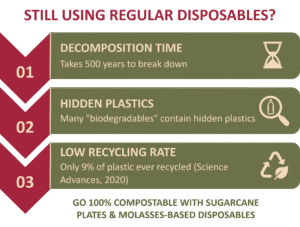
Consumers Are DEMANDING Sustainability!
It’s 2025, Genz’s and Gen alphas are taking over the world and the second thing they are interested about is ‘saving earth.’ They’re the flag bearers of sustainability and in a nutshell, the modern consumer also cares.
To lessen adverse environmental effects, 57% of consumers are willing to alter their shopping habits, according to IBM’s Institute for Business Value (2022). For sustainable packaging, more than 70% of consumers would pay more.
Additionally, 79% of consumers are altering their purchase preferences in response to sustainable credentials, according to a 2022 Capgemini Research Institute survey.
Companies that sell compostable plates, bagasse-based throwaway plates, and eco-friendly dinnerware profit both environmentally and financially in this setting.
Searches for “eco-friendly disposable plates” and “biodegradable tableware” have risen by more than 35% since 2023 on websites like Google and Instagram, according to social listening apps like Brand watch and Sprinklr. This suggests that customers are actively looking for these solutions in addition to being interested in them.
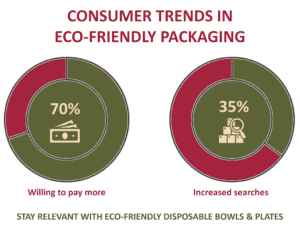
Regulatory pressure on brands accelerates the shift
Global regulations are speeding up the decline of conventional and traditional packaging:
- India: A nationwide ban on single-use plastics came into effect in July 2022 (MoEFCC, Government of India).
- EU: The Single-Use Plastics Directive bans items like cutlery, plates, and straws that aren’t compostable (European Commission, 2021).
- U.S.: States like California, New York, and Maine have adopted laws promoting compostable and recyclable materials.
This regulatory environment Favors products like biodegradable plates, eco-friendly disposable plates, and bagasse-fibre containers.
According to ResearchAndMarkets (2023), the global compostable packaging market is expected to grow at a CAGR of 13.5% from 2023 to 2028, propelled largely by government policies and public pressure.
Compostable Disposables is a buzz word these days, but do you know why?
Under industrial composting conditions, compostable disposables such as use-and-throw plates, disposable bowls, and bagasse-based trays are made to decompose in 180 days into CO₂, water, and biomass.
Common Materials:
- Sugarcane bagasse
- PLA (from cornstarch)
- Palm leaves, wheat bran, bamboo plates disposable
According to the Ellen MacArthur Foundation (2023), compostable materials can divert up to 60% of packaging waste from landfills when disposed of properly.
And, according to a 2022 University of Florida study, under controlled composting circumstances, sugarcane bagasse breaks down 70% more quickly than PLA.
And do you know why sugarcane bagasse along with molasses lead the way?
Why Bagasse?
- A byproduct of sugar production
- Strong, durable, and naturally compostable
- Requires no plastic lining, unlike paper plates
Why Molasses?
- Derived from sugar refining waste
- When combined with plant fibres, it adds binding strength and biodegradability
- Studies from the Journal of Polymers and the Environment (2022) show molasses can be used to develop high-performance, food-safe packaging when reinforced with cellulose fibres.
The eco-friendly disposable plates market using bagasse and molasses is growing at CAGR 6.6% and is projected to reach USD 370 million by 2027 (Allied Market Research, 2024).
Unlike traditional wood-pulp paper, sugarcane bagasse and molasses do not require tree cutting. This considerably lowers deforestation rates in areas where Agri-waste packaging is widely used.
How can food brands benefit from switching to eco-friendly disposables?
Elevated Brand Perception
Research from NielsenIQ (2023) found that 73% of global consumers say they would “definitely” or “probably” change their consumption habits to reduce environmental impact. And offering biodegradable disposable plates sends a clear sustainability message.
Waste Management Simplicity
Compostable disposables can be discarded with food waste, reducing labour and waste sorting.
Regulatory Compliance
Early adoption of eco-friendly disposables ensures brands are ready for future mandates and give them an extra edge.
Long-term Cost Efficiency
As industrial composting expands and bagasse made materials become more mainstream, unit costs are dropping.
Healthier Eating Experience
No hidden toxins or plastic linings = safer food contact. A 2023 study by the University of Leeds found microplastics in 36% of paper-based food containers.
Key Metrics & Environmental Impact
Switching to Chuk’s sugarcane-residue based compostable disposables can give up to:
- 70% less carbon emissions than polystyrene ( As per Carbon Trust report, 2023
- 100% composability in less than 180 days
- ~60% reduction in solid waste sent to landfill
- No microplastic residue left post-degradation
These numbers underscore how eco-friendly disposable plates can improve both ESG scores and operational hygiene.
According to a 2023 Harvard Business Review article, food firms that use sustainable packaging receive a 10% increase in repeat business and a 12–20% increase in brand loyalty.
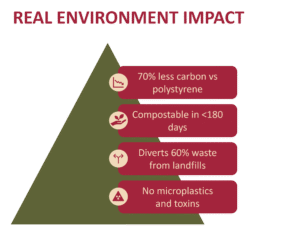
Key Takeaway: Food Brands and Yum brands can use compostables as a new business strategy
Not only can biodegradable plates, sugarcane plates, and containers made from bagasse help the environment, but they also help brands become more future-ready.
Making the conversion to compostable plate options is both strategic and sustainable given the expanding consumer base, tightening regulations, and improved supply chain access made possible by companies like Chuk.
Sustainable packaging is becoming more popular in India, where 42% of restaurant owners intend to make the switch within the next two years, according to Mintel Packaging Trends (2023).
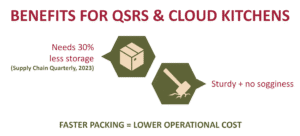
Compostables disposables are now supply chain ready and affordable too
Suppliers are quickly increasing output to fulfil the demands of the restaurant industry as demand for environmentally friendly disposable plates surges. Global sugarcane bagasse output increased by more than 25% between 2021 and 2023, fuelled by investments in agri-waste recycling and legislative support, according to GreenTech Insights (2024). Because sugarcane plates are now more widely available, biodegradable throwaway plates are now a viable choice, even for cloud kitchens and huge restaurant chains.
The price difference between molasses-based dinnerware and conventional foam or paper packaging has decreased by almost 18% in the last two years (Statista Packaging Index, 2024). Thanks to manufacturing economies of scale, even throwaway bowls and plates that may be used and thrown in compostable formats are now reasonably priced. This change presents compostable plate solutions as scalable as well as sustainable.
Operational Benefits: Eco-friendly disposables are sturdy, stackable, and kitchen-friendly
The adoption of biodegradable plates by food businesses has significant operational advantages. Compostable items, such as molasses-fiber containers or sugarcane plates, take up less storage space than polystyrene. Bagasse-based goods require 30% less storage space, according to a Supply Chain Quarterly (2023) study, allowing QSRs and cloud kitchens to optimize back-end logistics.
Eco-friendly disposable plates work better in hot, humid kitchens. Unlike paper or foam, molasses-based disposables don’t sag with heat or moisture, which reduces spoilage. By switching to compostable plate alternatives, brands reported up to 22% fewer returns on defective packaging, demonstrating how this resilience translates into cost savings.
Additionally, companies like Chai Point and Haldiram India have switched to biodegradable disposable bowls and lids, citing faster packing times and fewer employee complaints because of the stronger materials.
Customer Sentiment and Brand Loyalty
Eco-consciousness has become popular and is no longer a fringe fad. According to a Mintel India (2023) poll, 68% of urban customers think that food presented on environmentally friendly disposable plates is healthier and more upscale. Loyalty and retention may be significantly impacted by this subtle perception.
In fact, companies that employ compostable bowls and biodegradable plates have seen a 10–15% increase in return business, especially in metro areas. In a 2024 experiment involving eight cloud kitchens in Bengaluru and Delhi, 83% of patrons stated that packaging was crucial to how they viewed the quality of the food. This implies that bagasse containers and sugarcane plates enhance the whole experience rather than just holding food.
Additionally, postings using hashtags like #CompostablePlates and #EcoFriendlyTableware generate 40% greater interaction, according to social media sentiment analysis from Sprinklr and Brandwatch, demonstrating that implementing sustainable packaging improves brand narrative.
Disposal Infrastructure and Composting Ecosystems
Brands frequently worry about the mechanics of composting, but this is rapidly becoming irrelevant. As part of the Smart Cities Waste Program, more than 150 new composting facilities were added in India in 2024 alone (Compost Coalition India Report).
Wet + compostable packaging waste collection is now supported in cities like Pune, Chennai, Bangalore, and Gurugram, allowing patrons and restaurants to easily dispose of used plates and disposable bowls guilt-free. These websites make sure that disposable biodegradable plates decompose effectively and return to the land without contaminating groundwater or producing microplastics.
The impact is measurable. A World Bank Clean Cities report (2023) estimates that effective composting of molasses-based containers and sugarcane bagasse plates can reduce landfill dependency by 45% for the average fast-food outlet.
Summary: Why More Food Brands Are Choosing Chuk
Chuk distinguishes out as a true pioneer in a world where sustainability is now a corporate need rather than a choice. In addition to serving food, our compostable serving ware, eco-friendly disposable plates, and disposable bowls are designed to safeguard the environment, build your brand, and satisfy the changing needs of today’s conscientious consumers.
Chuk’s disposables are made entirely of sugarcane bagasse, the fibrous residue left over after juice extraction, as opposed to conventional paper plates or use-and-throw plates that have hidden layers of plastic or wax. It is completely compostable, decomposing in less than 180 days in professional composting facilities, and tree-free, preventing deforestation. Additionally, since it is plastic-free, there is little chance that microplastics would contaminate food or soil.
Our invention, however, is not only material. Since Chuk disposables are certified for food-grade safety, you can be sure that every plate, bowl, or tray satisfies the strictest health and hygiene requirements. Pure, natural fibre with no toxins or hidden layers.
We are aware of what food businesses need. For QSR chains, cloud kitchens, cafeterias, and delivery-focused food businesses seeking to complement contemporary eating experiences and ESG objectives, our packaging is perfect. Our disposables are designed to function well in the hectic food service industry and are robust, oil-proof, and heat-resistant.
Chuk is a statement rather than merely packaging. It’s your brand’s dedication to smarter decisions, cleaner operations, and a more environmentally friendly future. Make it compostable. Avoid trees. Go, Chuk.
You should use a cleaner plate for your food. A cleaner future is what your brand deserves.
According to its own lifecycle assessment assessments, Chuk’s compostable tableware line has already prevented more than 1500 tonnes of garbage from ending up in landfills.
So, are you prepared to switch? Discover Chuk’s entire collection of compostable serving ware, disposable bowls, and environmentally friendly plates right now.
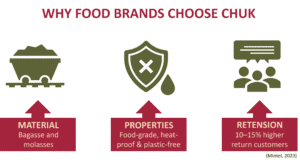
Select compostable. Select Chuk. Select impact!
Written by: Akansha Pal, Pakka Ltd.


